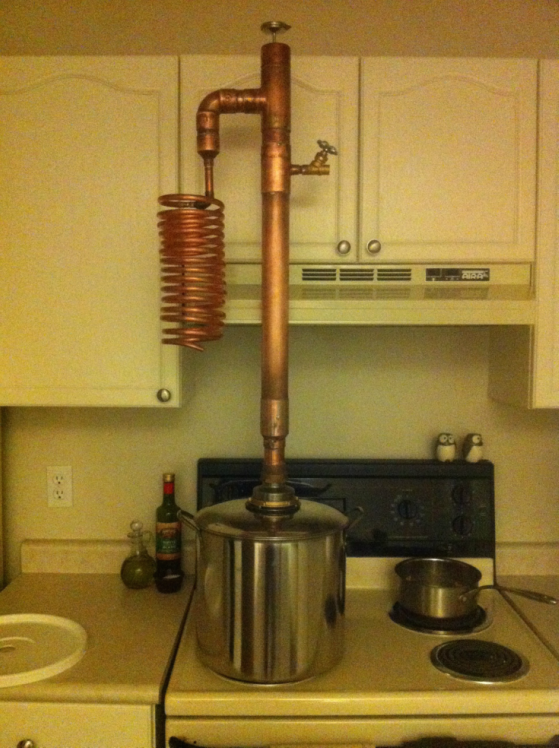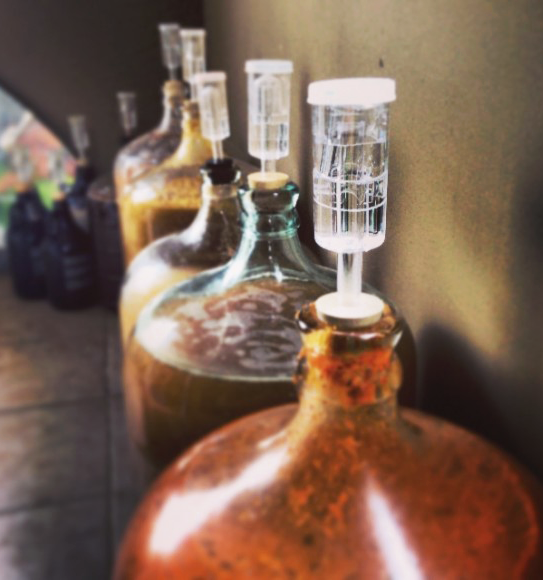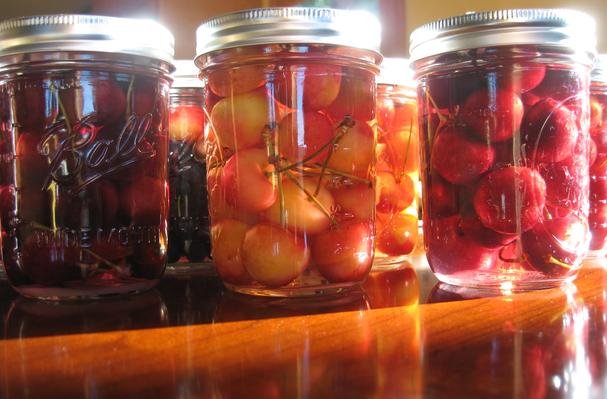White Lightening: Building a Homemade Still and Making Moonshine
Disclaimer: This is for education purposes only. Some state and provincial laws prohibit the distillation of alcohol and there are inherent risks associated with the practice. Toxic substances such as methanol are produced during the brewing process and high concentrations of alcohol pose a fire hazard. Use this information at your own risk.
Building a Re-flux Still
A re-flux still produces a pure form of high proof alcohol by re-distilling the alcohol vapor as it travels up the column to the condenser. As alcohol vapor travels down the condenser (coiled pipe) which is surrounded by cold water and as it comes into contact with the coils cold surface, it condenses back into a liquid to be gathered in a jar or pot.

I built this re-flux still out of a large stainless steel pot and ordinary copper plumbing supplies.
The column is made of 2” copper pipe and fittings, which were soldered together with lead free plumbing solder. The 2” cap at the top of the column holds a temperature gauge and was left un-soldered to act as a pressure relief valve for safety. The column is filled with copper mesh to aid in the re-flux action of the purifying process.
The coil is 3/8” copper coil that is surrounded by a bucket of ice water when the alcohol is being distilled. (Note: The longer the coil the better). Plastic tubing is connected to the bottom of the coil and drains alcohol into a jar or pot.
The difficult part of building the still was securing the column to the pot with a tight seal. My still failed in this department. I had to use duct tape to hold the lid on the pot and it leaked like crazy.
I recommend using a pot with a clamped lid like a pressure cooker or stainless steel milk can.
Brewing Alcohol

Source
- Dissolve 10 lbs of corn sugar in 5 gallons of fresh water in a fermentation pail.
- Add turbo yeast according to the directions on the package. Turbo yeast produces higher alcohol percentages (20% by volume) and ferments faster than regular yeast.
- Add an air lock device to the fermentation pail and allow liquid to ferment for 8 -14 days or until the airlock stops bubbling.
The Distilling process

Source
Set up the pot, column and condenser and add the mash (fermented liquid) to the pot.
Heat the liquid slowly. Ethanol (good alcohol) evaporates at 174F (78.5C). Methanol which is poisonous and can make you go blind, is also produced during the fermentation process and it evaporates at 148F (64C). Heat the mash to 168F (75C) (below ethanol’s evaporation temperature) and hold it there until liquid stops flowing from the condenser. The liquid is methanol so discard this down the sink. Note: Before doing so, notice its smell and try to compare it to ethanol’s smell later on.
Increase the temperature of the liquid slowly to a little above ethanol’s evaporation temperature – around 185F (85C) or so. Collect the liquid until it stops flowing. This is ethanol which you want to keep and which can be drank.
Discard the raining liquid which is the residual water and other chemicals produced during the fermentation process. You can also preform the entire distillation process again to try to get any remaining ethanol out of your mash if you wish.
Filter and Add Flavor if Desired

Source
The overall process produces high proof ethanol in the range of 85 - 98% alcohol by volume. Its highly flammable so be careful. You can dilute this with water if desired. I usually do 50-50 mix with water.
Run it through a charcoal filter (Brita filter) several times to increase purity and taste and/or add strawberries/raspberries or other fruit for flavor. Age it in an oak barrel or add an oak spiral to the bottle if you want to age it like a whiskey.
That’s it! I recommend doing more research if you actually attempt this process.
Feel free to comment or ask questions. Have you ever tried distilling alcohol? Do you have any good recipes or practices you would like to share?
@OriginalWorks
The @OriginalWorks bot has determined this post by @leaky20 to be original material and upvoted(1.5%) it!
To call @OriginalWorks, simply reply to any post with @originalworks or !originalworks in your message!
It's fascinating to read about the detailed process of building a homemade still and making moonshine. While it's important to be aware of the legalities and risks, the craftsmanship involved in creating something like this is impressive. Using copper and plumbing supplies to build a re-flux still really shows the ingenuity of homesteading. If you're curious about moonshine’s rich history and traditional methods, Good Ol Moonshine offers a fantastic look into its roots. From the early days of distilling to modern craft, it’s an interesting journey for any enthusiast!